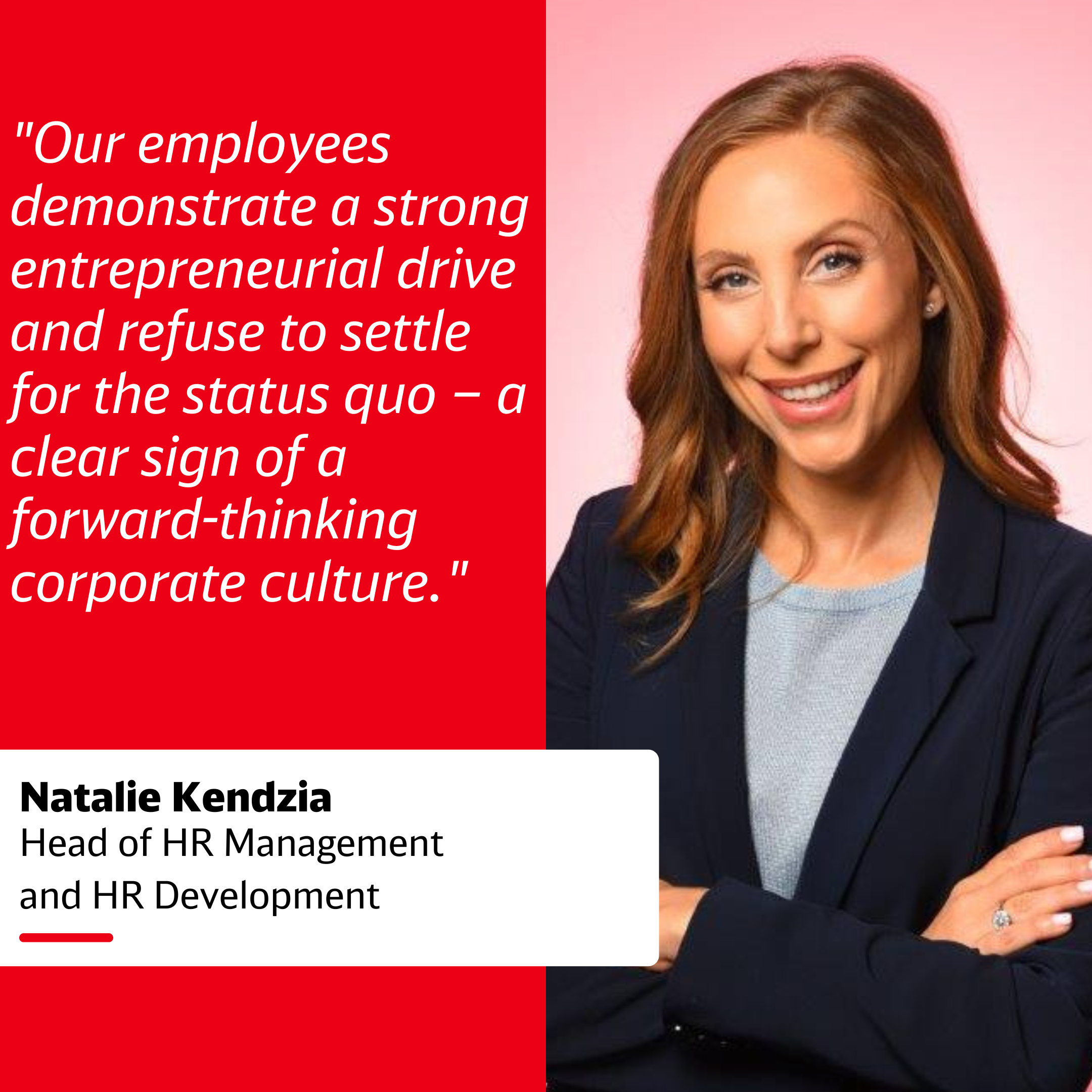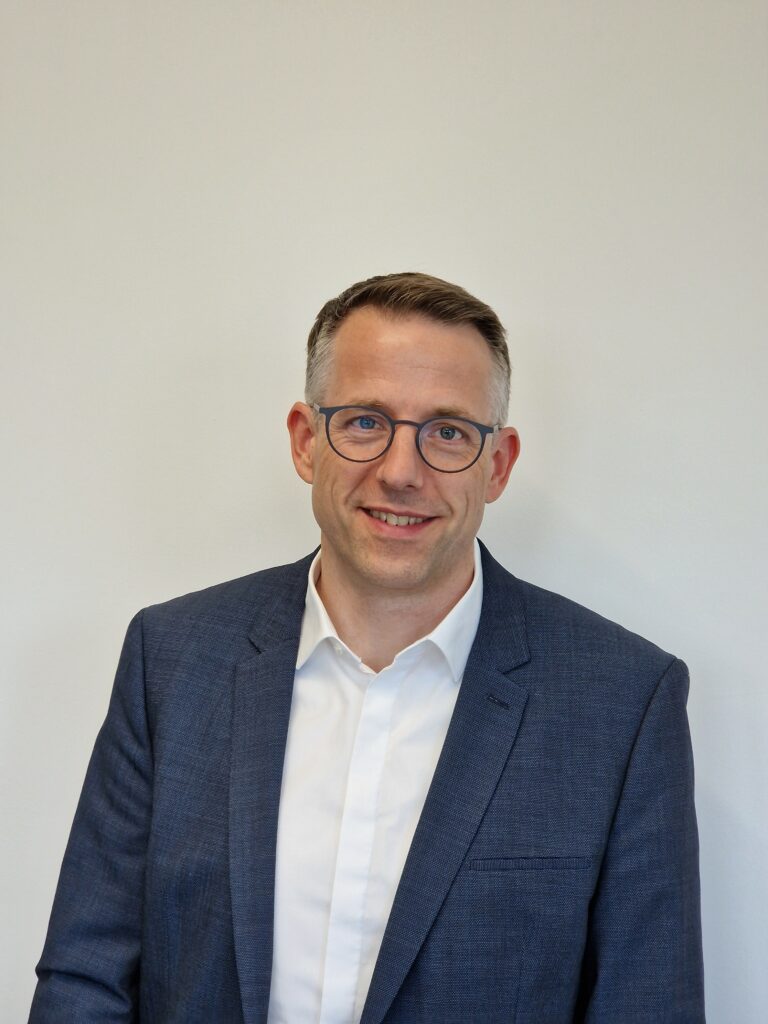The year 2025 opens up exciting prospects for the corporate world: the digital transformation offers new opportunities, innovative technologies create space for creative solutions and the dynamic labor market requires forward-looking HR strategies. How does an international engineering company shape these opportunities?

Contact
DB Engineering & Consulting
EUREF-Campus 14
10829 Berlin
Germany
In the interview with Natalie Kendzia, responsible for HR and management development at DB E.C.O. Group, it becomes clear that the key lies in a combination of targeted talent and junior staff development as well as a corporate culture that focuses on personal responsibility and psychological security. On the occasion of her recent appointment as patron of our cooperation with bbw University of Applied Sciences Berlin, we talked to her about modern HR development, the balance between central control and regional adaptation, and the special requirements of an international engineering company.
What are your strategies as the DB E.C.O. Group’s Head of HR development for ensuring human resource development at a multinational company with a workforce of over 7,000?
“Human resource development is moored in our corporate strategy. Of our five strategic directions in human resources, two are dedicated to this important topic in the narrower sense. One is professional and career development itself and the other is employee retention. We believe that both of these aspects are inextricably linked.
DB E.C.O. Group dovetails engineering, digital and operational expertise worldwide. DB E&C is the largest engineering firm in Germany, and operates in the areas of design, construction supervision, and environmental and geoservices. We rely on expertise and skills-based professional and career development in order to do this work. Furthermore, we closely analyze which skills we need now for each individual department and all for all of the technical disciplines. But looking ahead is even more important: What skills will our employees need so that we can continue to operate successfully on the market in the future?
I think this strategic foresight is essential, especially with regard to digitalization. We are in the middle of a veritable revolution, similar to the Internet revolution over 30 years ago. The job profiles of our many engineers will fundamentally change. We are already asking ourselves what new skills our employees will need in the future?
Take problem-solving expertise, for example. Problem-solving will become even more important because many processes will be prepared using AI. The results of AI-based preparation will be available for problem-solving and will need to be used in the right place. We need to prepare our existing employees for this future and align our recruitment strategy accordingly.
At the same time, the aim is to further strengthen our market position in Germany and worldwide. To this end, we provide targeted basic skills training. One application example is Building Information Modeling (BIM) in the planning sector – we offer comprehensive training series for this technology to ensure the complete digitalization of planning services. The same applies to the introduction of new software in other professional groups.
Project management is another example. Because we’re a project company, project management expertise is especially important for us. In 2024 alone, we conducted around 60 project management training courses with around 700 employees. We continuously analyze specific needs and offer targeted professional and career development so that we can meet those needs.”
At a company with over 7,000 employees, it can’t be easy to even ascertain requirements. How do you deal with factors that make it even more difficult, such as employee turnover?
“That is indeed an important aspect that we also look at from the employee retention perspective. There are two directions to our strategy: First, the long-term view of how we deal with the changing working environment and where we can make our own mark. And second, in the short to medium term, we are focusing on how we can give our existing employees – our many employees – an optimal working environment, where they can develop their full potential.
We’re focusing both on the framework and on the specific skills and abilities required. Managers and the company as a whole provide support.
We believe professional and career development is a very personalized process. That’s why we introduced our appreciation dialogue in 2024 and conducted our appreciation survey. We wanted to find out specifically what our employees need in order to perform their best and what effect certain conditions have on employee turnover.
This two-pronged approach has proven very effective. We analyze centrally what we need now and what we’ll need in the future to be able to offer our services successfully. And we also engage in a direct dialogue with people to identify very specific development needs. Our employee turnover fell significantly in 2024. There are certainly multiple factors that contributed to this, but I am confident that our initiative played an important role.”
You mentioned digitalization. Is digital professional and career development part of your approach to human resource development and if so, how has it been received?
“Digital professional and career development plays a pivotal role. E-learning has become so commonplace that to some extent it isn’t even considered especially innovative anymore. However, digital learning saw something of a renaissance during the Covid-19 pandemic. We were able to establish DB Learning World so successfully during the pandemic that it is now an integral part of our everyday work.
DB Learning World gives our employees access to a wide range of learning content, from videos to recorded event series. The basic idea is to make training content available anywhere and at any time.
We’re currently taking the idea even further with our new learning station. This modern learning experience platform offers Group-wide training, in other words content from all of Deutsche Bahn AG, not just from the DB E.C.O. Group. We’ve also integrated non-Group training, such as LinkedIn Learning, which is available in German and many other languages. Through these efforts we are creating a comprehensive digital learning ecosystem that offers all employees both internal and non-Group training opportunities.”
You referred to the Covid-19 pandemic. Are there any specific lessons that you learned from this unique situation involving a fundamentally different working environment?
“As a company with global operations, we were already used to working together virtually before the pandemic. What was new, however, was the consistent transfer of specific learning content to the virtual environment. The pandemic was definitely the catalyst. The experience we gained still shapes our approach to human resource development today.
Now we make a very clear distinction between situations where training content must be taught in person and where virtual formats are more than sufficient or even have certain advantages. Our required training on occupational safety is one specific example. All employees used to come on site for this training. Now we hold it virtually, which has been a success.
We’ve learned that not all content is suitable for digital-only, pre-produced communication. But whenever it makes sense, we systematically use the advantages of virtual formats.”
So a lot of the development content is already available online. What’s your objective, or what do you hope to achieve, for classroom training?
“Networking and creative exchange are most definitely at the fore when it comes to our in-person events. We believe that strong professional networks allow our employees to support each other. When they have questions, they’re able to find the right experts among their contacts.
One very successful example of this is the training program we created two years ago for high potentials for large-scale projects. We intentionally alternate between virtual and classroom modules. The classroom phases in particular significantly help to strengthen the network of future large-scale project managers. The format has proven highly relevant for our project business and has been extremely well received by participants.”
High potentials – that’s a big topic. How do you identify high potentials?
“We have a differentiated talent management system. It’s closely tied to our performance management system, but there are some considerable differences. Our performance management system uses a performance-based assessment, but talent management looks toward the future. It looks at someone’s potential to take on new or additional tasks based on their previous performance and skills.
We’ve honed the system and this year we’ll be introducing annual meetings in 2024 at DB E&C in Germany. Managers and HR will take a look together at the potential of all employees who perform well or very well. We have three different development paths: Management, project management – both technical and financial – and expert career tracks. We are currently hard at work on designing expert career tracks in particular, which involve developing experts in a specific area, and are piloting a concept for design.
Our project and management career tracks are already very well established and are systematically managed using the annual meetings at the start of each year. We have also implemented a succession planning system, where employees can nominate themselves for management positions once a year. Employees on standard salary can also take part. As part of this system we advertise positions where we will have a need in the coming years. In 2024, we advertised collective functions for women for the first time in order to specifically target female high potentials. A function was held open under the name “Women @ DB E&C” when we carried out our succession planning program, which meant that all women interested in a leadership role could apply regardless of which positions were available. The response was remarkable.”
For people who are already managers, what specific programs do you offer for support and professional and career development?
“The development opportunities for managers are strongly geared towards the person’s career phase and specific requirements. Here’s an example. When organizational changes are planned, managers can take change management seminars. This decision is made as part of a dialogue between the manager and their supervisor and in consultation with the manager overseeing the process.
Our training courses are particularly valuable for managers who will be taking on or have just taken on an expanded role. That’s because every career step brings new challenges with it, and we provide our managers with targeted support to overcome those challenges.
These programs are offered throughout the Group by DB Academy. They combine the latest methods from non-Group training institutes with DB-specific content. The dialogue with managers from other business units is one of the particularly valuable benefits of these programs. Training takes place at the historic Kaiserbahnhof in Potsdam, which provides an inspiring setting for strengthening cooperation within Team DB and for better understanding the various operational challenges facing the DB Group.”
What about employees who don’t aspire to be managers? How do you encourage their professional and career development?
“We use a dynamic process to manage professional and career development for employees. We evaluate development opportunities once a year, although these evaluations are not rigid. They can change. Here’s an example. Let’s say we have someone who shows potential for a management position in the medium term. But right now they have no desire for a management role or the right position isn’t currently available. In such cases, we’d focus first on the business side of professional development and keep up a dialogue with the person.
I believe that this kind of professional development is best done on the job. On-the-job development can mean widening the person’s areas of responsibility, such as having them manage an internal project, take an international assignment or help an experienced project manager in construction supervision.
These development steps are planned in regular discussions between managers and employees. The annual dialogue in particular is an important tool for deciding on appropriate development measures.”
What expertise is especially important for managers at a global company like the DB E.C.O. Group? Or, in other words, what characteristics do you look for to encourage? And what characteristics might be used as advance selection criteria?
“We avoid using blanket pre-selection since every management position has specific requirements. Figuratively speaking, it’s like a piano keyboard. Different notes are needed for different management tasks – whether that task is an overhaul of infrastructure assets or the creation of a new department – and tasks can vary greatly depending on the project.
We use DB Roles, which defines eight different leadership roles, such as entrepreneur and change manager. Management positions are filled using the Behavior Event Inventory (BEI), a structured diagnostic method that identifies aptitude for the specific roles needed.
In addition, we evaluate all managers at an annual calibration review. Supervisors evaluate the performance of the managers that report directly to them using the two-person rule. The calibration reviews go right up to the Managing Board level. It’s important to note that we don’t evaluate financial criteria only. We also consider various KPIs for social, qualitative and productivity-related dimensions. Examples include the percentage of women in leadership positions as well as specific situations. For example, if a manager meets their EBIT targets but their employee satisfaction is very low, we take a critical look at the cost of this economic performance.
This holistic view is fundamental to our approach at the DB E.C.O. Group. We strongly believe that high-performing teams are only successful in the long run if they act in accordance with our company’s values. This includes values and parameters that go far beyond purely economic KPIs.”
You mentioned women in leadership positions. Are there any programs to promote diversity in leadership positions or in the workforce in general?
“We focus on raising cultural awareness at work instead of general diversity training for managers. Cooperation between our design centers in Romania and India and the German design units is one current example. It’s important to understand differences in the way people cooperate that may be due to cultural misunderstandings. Awareness-raising formats are conducted using specific examples. The teams learn about cultural differences and use them to work together successfully.
One particular focus is on advancing women in leadership positions. DB has set an ambitious target of having 40% of leadership positions held by women by 2035. We have established a variety of initiatives to help us reach this target, and I’d like to highlight two measures in particular:
- The SHE.C.O. network, with 250 members, which networks and encourages women in leadership positions, women aspiring to a leadership role, and women in business and project functions
- A new Lead program specifically for female emerging leaders beginning in early 2025 with 13 participants
These measures are part of our strategic objectives and are measured using specific KPIs. These are some of the examples of how our targeted training and networking opportunities systematically promote diversity.”
You talked about corporate culture. How do you foster a culture of learning and what role does individual responsibility play in professional and career development, for example? You said that people can nominate themselves to be considered high potentials.
“That’s a really exciting point. Learning and professional development aren’t a one-way street. We view this process as a reciprocal one, where ownership plays a crucial role. Our experience shows that lasting development can only succeed if employees are personally invested. Employees need to have a clear idea of their goals and actively discuss them with their manager.
In addition to the regular nomination process by managers, employees always have the option to nominate themselves, for example for our SHE.C.O. network or our high potential programs. I think this dual nomination option is essential so that we can make development opportunities available for all employees and engage in dialogue with them, for example through annual performance reviews.
We also support further training. As a human resource development department, we are often contacted by employees who are interested in pursuing a Master’s degree, for example. In cases like these, we look at the added value for professional development at the company together, and we can help cover some of the program costs.
Our employees are really proactive. They don’t wait to be offered development opportunities. They take the initiative to get involved and help shape their own professional development. As a company, we support this drive and create the appropriate framework.”
How would you describe the corporate culture at DB E.C.O. Group?
“The corporate culture at DB E.C.O. Group is based on Deutsche Bahn’s compass for strong teamwork, which is defined by five compass principles. The principles are not just guidelines. They are also part of the annual performance appraisal. Our employee survey, which is conducted every two years and collects information relating to the compass criteria, allows us to continuously measure and evaluate the development of our corporate culture.
However, DB E.C.O. Group differs from the Group as a whole in a number of important respects. Of course, that has to do with the fact that we are an international business unit. I think that has a very strong impact on corporate culture. What’s more, we have a lot of engineers at our company. Over 80% are college graduates and most have a degree in a technical field. This definitely has an influence on the culture and the way we interact at the company.
I see a really high business drive here, and that’s something I really appreciate about the company. It’s about the bottom line; employees want the company to do well.
This is also reflected in the latest employee survey. Respondents were quite critical of digitalization progress, which I think is a good sign of how committed and future-oriented our employees are. The status quo isn’t good enough for them. They want the company to evolve and improve.
The survey pointed out something else, too. The strong psychological safety at our company really stood out, even in comparison with the rest of the Group. Our employees are free to express their ideas and opinions, which are heard and considered. I think that this is one of the real features of our corporate culture and also sets us apart from our competitors since it makes high performance much more likely.”
We’ve talked a bit about the international environment. How do you handle the challenge of supporting employees in different regions and cultures equally? Do you have a strategy for this or is it something that has to be handled case by case using good judgment?
“We take a differentiated approach to international human resource development that accounts for cultural differences and regional characteristics. We think globally but act locally.
Human resource development is structured in such a way that basic responsibility and strategic orientation are managed centrally. And then the actual implementation and adaptation to local conditions happen in close cooperation with our international HR experts, in particular by my esteemed colleagues and our specialists for international HR development, Giada Feroce-Vernikovsky for DB E&C and Katrin Sünderhauf for DB International Operations.
Our appreciation initiative is a good example of this approach. We developed the basic idea centrally, but we check what adaptations are needed for the particular international market. We start from the realization that initiatives and instruments that are successful in Germany do not automatically have the same impact in other countries, like India. We therefore always evaluate and develop specific measures in the relevant cultural and regional context.
This flexible approach allows us to standardize the quality and basic principles of our human resource development across the Group while also meeting specific cultural and regional requirements.”
How has the shortage of skilled workers affected human resource development strategies and what measures are we taking as a company to target and retain talent?
“The shortage of skilled workers has had a significant impact on our HR strategies. We are taking a two-pronged approach to tackling this challenge: Increasing employee retention and adapting our recruitment strategy.
In terms of employee retention, we launched our appreciation initiative, for example. The focus is on retaining and developing qualified employees since it is difficult to compensate for the loss of expertise and it is becoming increasingly challenging to find replacements.
In terms of recruitment, we are more flexible than we used to be. In the past we looked for candidates who fulfilled 95% of the job requirements. We’ve changed our perspective somewhat. Even applicants who are only an 80% match, for example, can be a good fit for the company if we are prepared to support them. This means we need to be more willing to take risks and invest more in onboarding. We are also increasingly open to people who are changing careers and have comparable qualifications, even if there are certain limits to how much of this we can do because we have to work within the requirements of German Federal Railway Authority.
One new area we’re focusing on is cross-border recruitment. We’re working hard to attract international specialists for the entire rail system in Germany. This presents us with complex challenges, especially language challenges. Our working documents and processes are mostly in German, and it’s hard for people to acquire relevant qualifications. We’re developing strategies to deal with this, from digital translation tools to language pre-qualifications. However, we still face certain hurdles, such as the necessary subject-matter exams, which require knowledge of German.
These developments mean that we need to fundamentally rethink our human resource development strategies. We need to find innovative ways to attract and retain qualified employees while continuing to meet our industry’s high quality standards. When I look at the company’s economic situation and the results of the employee survey, I can definitely say that we are on the right track.”
Thank you for these exciting insights!





